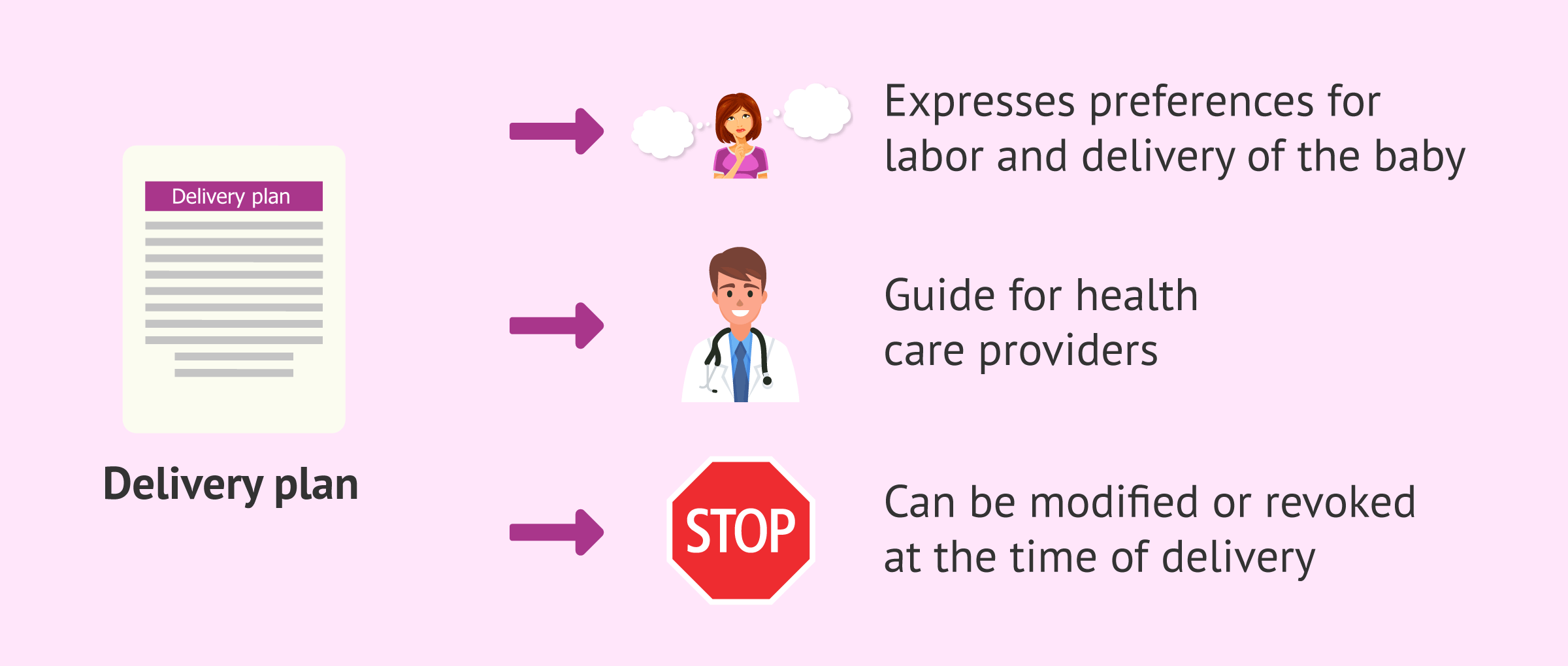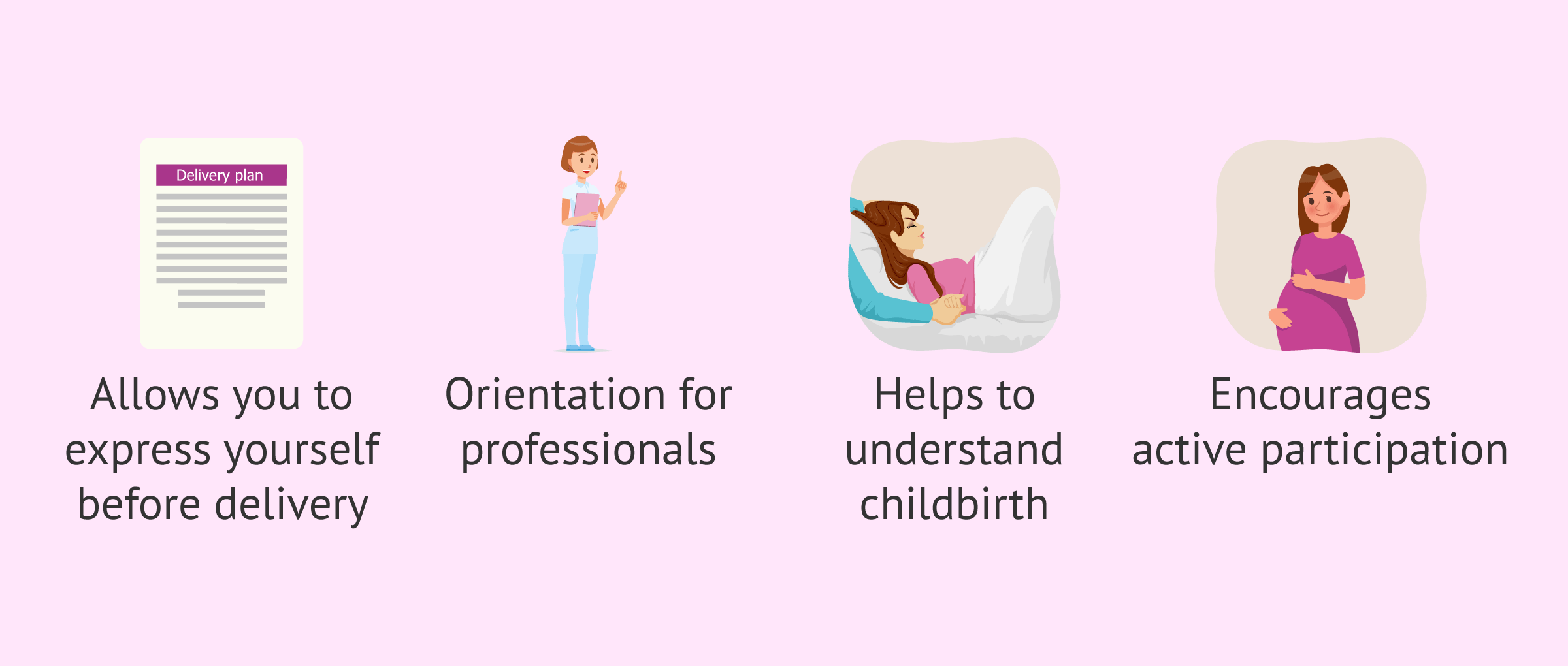Although it is not mandatory, it is a good idea for the pregnant woman to make her birth plan, so that she can express in writing her wishes and how she would like to be cared for during labor and delivery of her baby.
In addition, being informed and consulting with specialists about the possible options when writing the birth plan will give the woman a more complete idea of what is going to happen on the day of delivery and a greater sense of control and participation, even though possible unforeseen events may occur.
Provided below is an index with the 8 points we are going to expand on in this article.
- 1.
- 2.
- 3.
- 4.
- 5.
- 5.1.
- 5.2.
- 6.
- 7.
- 8.
What is the birth plan?
The birth plan is a document where the pregnant woman states in writing what her preferences and needs are for when the time comes for labor and delivery of the baby. It is also known as labor and birth plan.
Thanks to the birth plan, the woman's will is expressed. In this way, the birth plan serves as a guide for professionals to care for her, her companion and her baby (during labor, delivery and postpartum hospital admission) in the way the woman wants.
However, the pregnant woman should be aware that unforeseen events may arise during labor that may cause events not to occur as stipulated in the birth plan. Therefore, this document should not be understood as a "planning" of how the delivery is going to happen.
Rather, it is about offering the pregnant woman the possibility of being informed, assessing, deciding and communicating her preferences prior to the day of delivery, when it can be more complicated due to the situation and the importance of the moment she is living.
However, the woman can modify her birth plan and even revoke it partially or in its entirety during the course of events.
When to start writing the birth plan?
Preparation of the labor and birth plan can be started between the 28th and 32nd week of pregnancy.
Ideally, around the 28th week of gestation, the midwife will inquire whether the pregnant woman is aware of this document and will give her all the necessary information. In this way, if the woman wishes, she can fill in her preferences little by little and, in subsequent consultations, she can ask any questions she may have.
Before submitting it, it is important to review the birth plan in advance with the midwife or gynecologist, so that they can clarify certain issues that arise or detect if something is not possible and, thus, the woman can make fully informed decisions and be safe.
Similarly, it is essential that the pregnant woman knows well in advance how to send her completed birth plan to the hospital where she is going to give birth. In addition, upon delivery, the pregnant woman should keep a stamped copy of her birth plan and ensure that she receives proof that the birth plan has been delivered.
How to fill in the birth plan?
First of all, it is interesting to know that more and more hospitals have a template or form for the birth plan, as well as the Ministry of Health, which the woman can fill in according to her preferences in terms of childbirth and postpartum care: accompaniment, delivery room, practices during labor and delivery and pain relief, practices after birth and postpartum care.
However, a woman can write her own birth plan document in the format she feels most comfortable and confident with.
On the other hand, when drafting the birth plan, it must be taken into account that options that are not recommended by scientific evidence cannot be included. This means that, of course, the pregnant woman cannot choose practices that are unnecessary or harmful in the course of a normal delivery.
Finally, the recommendation is to consult and be informed of all the options available at the hospital where you are going to give birth and ask any questions to the midwife or obstetrician-gynecologist. You should also review the birth plan with them, to make sure you know exactly what is involved in each of the options chosen.
However, it is important to know that, despite having completed the birth plan, some unforeseen event or complication may occur during labor and the woman should be prepared for it. In this case, the woman will be informed, the most appropriate course of action will be indicated and explained, and consent will be requested.
Advantages of submitting a birth plan
Among the main advantages of the woman preparing and having a birth plan in place at the time of delivery are:
- It allows to be informed, to decide and to express preferences prior to the moment of delivery, when the situation itself may make it difficult.
- It orients health care providers to the woman's wishes for childbirth and postpartum care.
- It helps to better understand everything related to childbirth, since it is ideal to ask and clarify any doubts with the specialist when filling it out.
- It favors the active participation of the pregnant woman in making decisions about the birth of her baby.
However, despite these advantages and although it is becoming more and more known, many women do not fill out and submit their birth plan.
FAQs from users
What happens if the pregnant woman does not complete a birth plan?
If the pregnant woman has not previously completed a birth plan, she will have to make decisions and express her preferences to the health personnel at the moment of delivery, which may be made difficult by the situation she is experiencing.
Therefore, it is advisable to be informed of all the available options, to assess, decide and communicate preferences through the birth plan prior to this moment. This also helps the woman to learn about the birth process and to participate actively.
What issues can be decided on in the birth plan?
The birth plan, although there are forms or templates to help the woman fill it out, can be a document written by the woman herself as she feels most comfortable, including the options she wishes, as long as they are actions recommended by scientific evidence.
Among the most common topics included in birth plans are the following:
- Accompaniment and companion participation.
- Special needs.
- Delivery room: type (if several are available), privacy, preference for using own clothes....
- Assistance and care during the dilation period: personnel, enema, shaving, feeding, position for delivery, mobility, pain relief options, use of support materials, bath or shower during dilation...
- Interventions during labor: fetal monitoring, pelvic exams, medications to accelerate labor, routine venous line cannulation, bladder catheterization, rupture of the bag...
- Expulsion period: pushing, episiotomy, birth and skin-to-skin, initial care of the baby, cutting the cord, initiation of breastfeeding...
- Delivery (delivery of the placenta).
- Baby care: preventive medications and vaccinations, hygiene, breastfeeding...
- Preferences for instrumental delivery or cesarean section.
In any case, for guidance, it may be a good idea to consult one of the available templates, even if the woman finally drafts her own birth plan document.
Suggested for you
If you want to read more information related to the process of childbirth, we recommend you to visit this link: Childbirth: preparation, types and possible complications.
On the other hand, if you want to know more about how to prepare for childbirth, you can read the following article: How is childbirth preparation - Theory and practice?
We make a great effort to provide you with the highest quality information.
🙏 Please share this article if you liked it. 💜💜 You help us continue!
References
Ahmadpour P, Moosavi S, Mohammad-Alizadeh-Charandabi S, Jahanfar S, Mirghafourvand M. Effect of implementing a birth plan on maternal and neonatal outcomes: a randomized controlled trial. BMC Pregnancy Childbirth. 2022 Nov 22;22(1):862. doi: 10.1186/s12884-022-05199-5. PMID: 36419027; PMCID: PMC9682672. (View)
Ahmadpour P, Mosavi S, Mohammad-Alizadeh-Charandabi S, Jahanfar S, Mirghafourvand M. Evaluation of the birth plan implementation: a parallel convergent mixed study. Reprod Health. 2020 Sep 7;17(1):138. doi: 10.1186/s12978-020-00989-6. PMID: 32894145; PMCID: PMC7487561. (View)
Bell CH, Muggleton S, Davis DL. Birth plans: A systematic, integrative review into their purpose, process, and impact. Midwifery. 2022 Aug;111:103388. doi: 10.1016/j.midw.2022.103388. Epub 2022 May 25. PMID: 35640358. (View)
DeBaets AM. From birth plan to birth partnership: enhancing communication in childbirth. Am J Obstet Gynecol. 2017 Jan;216(1):31.e1-31.e4. doi: 10.1016/j.ajog.2016.09.087. Epub 2016 Sep 21. PMID: 27664497. (View)
Ghahremani T, Bailey K, Whittington J, Phillips AM, Spracher BN, Thomas S, Magann EF. Birth plans: definitions, content, effects, and best practices. Am J Obstet Gynecol. 2023 May;228(5S):S977-S982. doi: 10.1016/j.ajog.2022.12.011. Epub 2023 Mar 23. PMID: 37164502. (View)
Grupo de Trabajo creado en el seno de los Comités Institucional y Técnico de la Estrategia de Atención al Parto Normal y de Salud Reproductiva. Ministerio de Sanidad, Política Social e Igualdad. Plan de Parto y Nacimiento. (View)
Hidalgo-Lopezosa P, Cubero-Luna AM, Jiménez-Ruz A, Hidalgo-Maestre M, Rodríguez-Borrego MA, López-Soto PJ. Association between Birth Plan Use and Maternal and Neonatal Outcomes in Southern Spain: A Case-Control Study. Int J Environ Res Public Health. 2021 Jan 8;18(2):456. doi: 10.3390/ijerph18020456. PMID: 33430039; PMCID: PMC7828065. (View)
Medeiros RMK, Figueiredo G, Correa ÁCP, Barbieri M. Repercussions of using the birth plan in the parturition process. Rev Gaucha Enferm. 2019 Jun 6;40:e20180233. Portuguese, English. doi: 10.1590/1983-1447.2019.20180233. PMID: 31188973. (View)
FAQs from users: 'What happens if the pregnant woman does not complete a birth plan?' and 'What issues can be decided on in the birth plan?'.





